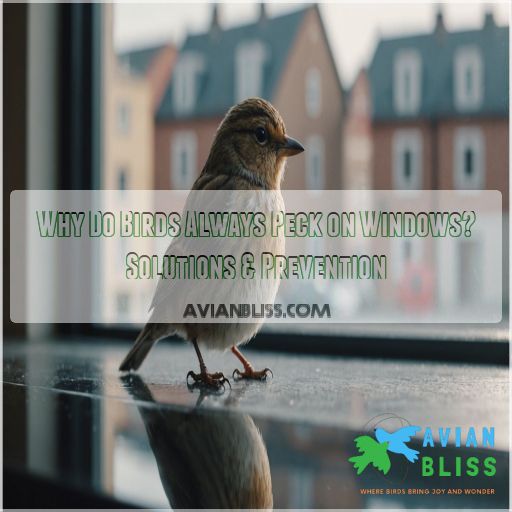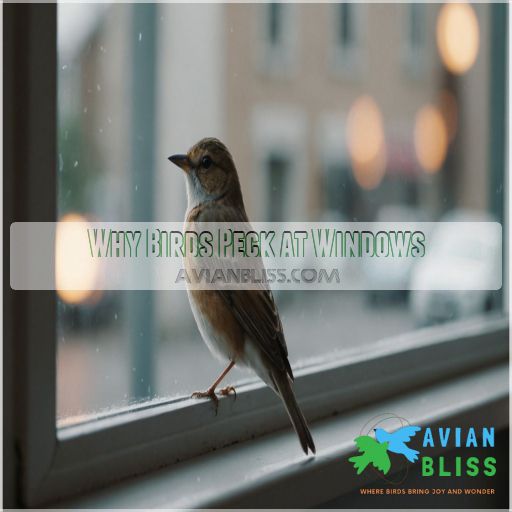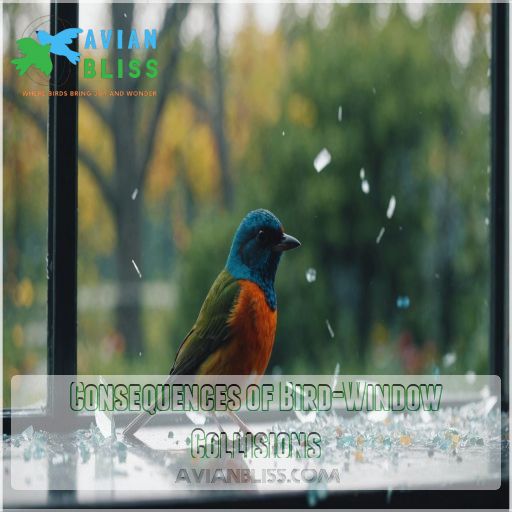This site is supported by our readers. We may earn a commission, at no cost to you, if you purchase through links.

But don’t worry, there are plenty of ways to outsmart them and prevent those frustrating pecks. From installing window film to using bird-friendly decals, you can create a safe haven for our feathered friends and keep your windows looking pristine. Just wait until you see the clever tricks we have up our sleeve!
Table Of Contents
- Key Takeaways
- Why Birds Peck at Windows
- What Attracts Birds to Windows
- Consequences of Bird-Window Collisions
- Solutions for Bird Attacks on Windows
- Bird-Proofing Your Home and Car
- Minimizing Light Pollution and Its Impact
- Frequently Asked Questions (FAQs)
- What does it mean when a bird keeps pecking at your window?
- Why are birds attracted to my windows?
- What does a bird hitting your window mean?
- How to keep birds from hitting a window?
- How does window design influence pecking behavior?
- Do reflective films work against window pecking?
- What role does seasonality play in pecking frequency?
- Can bird-friendly glass reduce pecking incidents?
- How do indoor plants affect pecking incidents?
- Conclusion
Key Takeaways
- Don’t let those pesky birds ruffle your feathers – their window pecking is just a case of mistaken identity! They see their own reflection as a rival bird invading their territory, especially during breeding season. But no need to wing it – there are plenty of clever tricks to outsmart them and keep your windows pristine.
- You’re the architect of your bird-friendly oasis! Dress up your windows with decorative decals, screens, or even a DIY soap film to reduce those reflections that drive birds bonkers. It’s a win-win – your feathered friends stay safe, and your home looks fabulous.
- Lights out, birds delight! Reducing artificial light at night can be a real lifesaver for our winged wonders. Join the Lights Out initiative and let those dark skies shine – your energy bill will thank you, and the birds will be singing your praises.
- Embrace your inner bird whisperer and create a cozy, bird-friendly haven at home. Strategically placed feeders, baths, and native plants will have your feathered friends flocking to your backyard oasis. Plus, you’ll get to enjoy their feisty antics from the comfort of your own nest.
Why Birds Peck at Windows
Birds peck at windows because they think their reflection is a rival bird trying to invade their territory, especially during the intense drama of breeding season.
Imagine seeing what you believe is the world’s most persistent intruder on your front porch day after day—no wonder these feathered friends get a bit aggressive!
Territorial Behavior in Birds
Birds see window reflections as rivals invading their turf, sparking territorial behavior akin to defending a backyard BBQ, much like how hummingbirds fiercely protect their feeding territories like this.
Birds can become aggressive during the mating season, which can lead to window strikes.
Remove bird feeders to enhance bird safety.
Breeding Season and Aggression
Aggression skyrockets during breeding season when birds become fierce defenders of their turf, protecting nests from imaginary foes.
It’s like springtime superhero mode!
Bird-friendly windows with decals help diffuse territorial disputes and prevent annoying window collisions.
Common Culprits Behind Window Attacks
American Robins, Northern Cardinals, and Chipping Sparrows are common culprits behind those pesky window attacks. But don’t worry – their territorial antics are just a natural part of breeding season.
Preventing Bird-Window Collisions
When birds mistake their reflection for a rival, prevention is key.
Consider these tips:
- Install window film to reduce reflections.
- Use bird deterrents like decals.
- Move bird feeders away.
- Employ reflective surfaces smartly.
What Attracts Birds to Windows
Ever wondered why birds are busy pecking at your windows?
It’s mostly because they’re caught admiring their own reflections, mistaking them for rival birds trying to move into their territory—birds can be so vain, can’t they?
Reflections in Windows
Birds often attack windows because they mistake reflections for rivals.
So, keeping your windows bird-friendly can help.
Different types of window reflections affect birds differently.
Here’s a breakdown of reflection types and bird responses:
| Reflection Type | Bird Perception |
|---|---|
| Clear Glass | Open Sky or Vegetation |
| Tinted Glass | Rival Bird Reflection |
| Low-E Glass | Subtle Rival Movement |
| Mirrored Tint | Strong Rival Presence |
| Patterned Glass | Safe Passage Barrier |
Visual Deterrents for Birds
Decals, screens, and hanging objects can deter birds from mistaking windows for open space.
Get creative with bird-friendly garden art to keep your feathered friends safe.
Reflective film also helps reduce window reflections that attract birds.
- Decals
- Exterior screens
- Hanging objects
- Reflective window film
Reducing Window Reflectivity
On sunny days, windows can act like mirrors, fooling birds with reflections. To prevent this avian confusion, try using window film, glass treatments, or window coverings to dull those pesky reflective surfaces. Your feathered friends will thank you.
Creating a Bird-Friendly Environment
Reducing window reflectivity is important.
You’ll create a bird-friendly environment by installing bird feeders and using thoughtful landscaping.
These tactics, paired with smart window treatments and habitat restoration, help minimize light pollution and protect our feathered friends.
Consequences of Bird-Window Collisions
Bird-window collisions aren’t just a minor inconvenience—they can lead to hundreds of millions of avian deaths annually, pushing some species to the brink.
Simple window treatments can be a life-saving step.
As humans, we’ve a big role to play in this feathery crisis.
Hundreds of Millions of Birds Die Annually
Tragically, up to 1 billion birds perish annually in the U.S. from window collisions.
This staggering loss underscores the urgent need for bird-friendly home design and reduced light pollution to safeguard our feathered friends.
Impact on Bird Populations
While bird deaths from window collisions sound bleak, they join habitat loss, climate change, and pollution as real concerns.
If you’re scratching your head, worry not—conservation efforts are the silver lining amidst these cloudy threats!
The Role of Humans in Preventing Collisions
You can play a key role in preventing bird-window collisions by raising window-safety awareness and supporting bird-friendly architecture.
Join citizen science projects or education campaigns to spread the word—every little effort makes a big difference!
Importance of Window Treatments
Ever wondered why window treatments matter for bird safety?
They make windows bird-safe by cutting reflections.
Think of them as sunglasses for glass!
Use window film benefits or glass alternatives to avoid surprise bird collisions.
Solutions for Bird Attacks on Windows
If you’re dealing with persistent bird attacks on your windows, don’t worry – there are plenty of effective solutions to try.
From covering the glass to installing specialized window films, you can easily deter birds and prevent damage to your home.
Covering Windows to Eliminate Reflections
Bird-window collisions can be heart-wrenching, impacting our feathered friends.
Window film or decorative fabric can be used to cover windows, transforming reflections into non-threatening surfaces.
These window treatments create a bird-friendly design and prevent accidents.
Using Soap to Create an Opaque Film
Sometimes, those stubborn reflections just won’t quit, will they? Soap film offers a crafty DIY solution. Give it a whirl:
- Slather soap onto windows.
- Reduce pesky window reflectivity.
- Employ this feather-friendly bird deterrent.
Installing Perforated Window Film
Imagine turning your window into a bird-friendly view protector!
DIY install of perforated window film is a smart way to safeguard birds.
Explore film types, weigh costs, and minimize collisions without compromising your room’s natural light.
Hanging Dangling Items to Deter Birds
Why not try hanging dangling items like cords, stained glass art, or strings of beads inside your windows? These can effectively disrupt birds’ reflections and deter them from pecking like reflective predator eye diverters.
- Hang cords, strings, or other dangling items inside the window to create a visual barrier.
- Incorporate decorative elements like stained glass or beads to make the window less appealing.
- Adjust the placement and movement of the items to keep birds guessing and discourage attacks.
Minimizing Light Pollution and Its Impact
Bird-Proofing Your Home and Car
It might seem like birds have a personal vendetta against your windows and car mirrors, but this behavior is actually pretty common, especially during breeding season.
By identifying high-risk windows and taking simple steps like installing exterior screens or using Acopian BirdSavers, you can protect both your home and car from these feathered enthusiasts.
Identifying High-Risk Windows
To stop birds from mistaking your glass for a rival’s nest, look out for large windows, corner windows, glass doors, or those with feeders.
Reflective surfaces can fool birds into thinking they’re heading for the great outdoors.
Installing Exterior Screens and Netting
Ever installed screens and netting on windows? Talk about a cost-saving DIY!
With basic materials, you create a barrier that reduces bird collisions.
It’s simple, practical, and the birds won’t peep at their pesky reflections.
Using Acopian BirdSavers and One-Way Film
Ready to make your windows bird-friendly? Acopian BirdSavers can help! These dangling cords act like a hero’s cape, alerting birds.
Pair them with a one-way film for:
- Reduced reflections
- Bird safety
- Window appeal
Protecting Your Car From Bird Attacks
While Acopian BirdSavers work wonders on windows, protecting your car is a whole new ball game.
Bird deterrent products can be considered.
Use car mirror covers or side mirror adjustments.
Sometimes, a simple tarp offers the best protection.
Minimizing Light Pollution and Its Impact
To help protect birds from pecking at your windows, reduce artificial light at night which can confuse them and lead to collisions.
Lights Out initiatives in your area—it helps safeguard migrating birds but might just lower your electric bill and give you a better night’s sleep!
Reducing Artificial Light at Night
Reducing artificial light at night is really important to protect migrating birds.
Dim those porch lights, draw curtains, and embrace the beauty of dark skies – your feathered friends will thank you.
Supporting Lights Out Initiatives
Lights Out Initiatives can have a big impact on nighttime safety for birds.
Keeping our lights off helps bird migration.
Let’s be part of the solution:
- Install timers for lights.
- Use blackout curtains.
- Switch to downward-facing bulbs.
Minimizing the Urban Glow
Think of city light as a GPS for birds on nighttime migration.
Thankfully, you can dim outdoor lights or install bird-friendly lighting.
Cities sprouting urban design changes are unsung heroes in reducing harmful light pollution impact.
Creating a Bird-Friendly Environment at Home
Creating a bird-friendly environment at home is like throwing a birdie bash. You’ll want:
- Bird feeders far from windows.
- Window treatments to minimize reflections.
- Smart landscaping choices.
- Bird baths positioned thoughtfully.
Light pollution? Shut it down!
Frequently Asked Questions (FAQs)
What does it mean when a bird keeps pecking at your window?
Up to 1 billion birds die annually from window collisions.
Your feathered friend pecks the glass, thinking its reflection is a rival bird.
This territorial behavior happens during breeding season.
Covering the window can help deter these attacks.
Why are birds attracted to my windows?
Birds see your windows as mirrors reflecting rival birds, sparking territorial tussles.
During breeding seasons, those feathery warriors peck away, defending their turf.
Tactics include window film, decals, or even friendly scare tactics to halt these antics.
What does a bird hitting your window mean?
When a bird hits your window, it’s usually an accident – they see a reflection and think it’s open space.
Don’t worry, this behavior isn’t a bad omen; it’s just a bird being a bird. (Source)
How to keep birds from hitting a window?
Tackle bird-window collisions with flair: slap on some decals or lines to break up reflections.
Hang whimsical danglies or cozy up windows with screens.
Birds won’t see rivals or open skies, just your welcoming home!
How does window design influence pecking behavior?
Window design really impacts bird pecking behavior since over a billion birds die annually from window collisions.
Make windows bird-friendly to stop those determined fluttery warriors.
Use less reflective glass or apply decals.
Do reflective films work against window pecking?
Reflective films can stop birds from pecking at windows if applied outside.
They disrupt reflections that birds attack, reducing pecking over 35%.
Inside application falls flat, so embrace the power of exterior solutions! (Source).
What role does seasonality play in pecking frequency?
Ah, the avian dance of territorial tunes – a seasonal symphony that echoes through the glass.
As breeding season blooms, our feathered friends can’t resist the allure of their own reflections, putting on quite the show.
But fret not, with a few clever tricks, you can keep the peace and let them strut their stuff in harmony.
Can bird-friendly glass reduce pecking incidents?
Switching to bird-friendly glass is like installing a ‘no trespassing’ sign for peck-happy birds.
These special windows, visible to birds but invisible to you, drastically reduce those pesky pecking incidents, offering peace and quiet to all.
How do indoor plants affect pecking incidents?
Indoor plants can make windows more attractive to birds, as they might see them as potential nesting spots or sources of food.
Plus, reflections of foliage can confuse them, increasing the likelihood of pecking incidents.
Conclusion
Like a magician pulling a rabbit from a hat, you can make those puzzling bird-window pecks disappear with a few clever tricks.
By understanding why birds always peck on windows, you’ve already stepped into a world of solutions.
From blocking reflections to using bird-friendly decals, turning your home into a safe haven is within reach.









